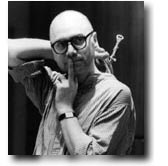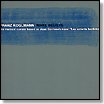

Courtesy of Frank Koglmann

Between the Lines
A FIRESIDE
CHAT WITH FRANZ KOGLMANN
I am rarely surprised these days. Everything is so predictable, it is
difficult to just keep awake let alone interested. Bummer, since this
is the prime of my youth and I ought to be fighting a war or building
a suburb or something. Tragic. But gladly, there is Franz Koglmann's between
the lines and all his extensive work on the Hat labels to keep me awake
during rush hour. The following is an interview with a part duex to come
with the maestro himself, unedited and in his own words.
FRED
JUNG: Let's start from the beginning.
FRANZ
KOGLMANN: I started with classical music at Vienna's conservatory at the
age of 14 (before I had accordion lessons) and my interest was to become
a composer or eventual a trumpet player in a symphony orchestra - both
maybe. At this time, parallel, I developed a great interest to listen
to jazz on the radio. Armstrong was first, but soon my preference changed
to the so-called cool players like Chet Baker. My study was interrupted
by the military-music and after that, at the age of twenty-one, I heard
Miles Davis live with Wayne Shorter. My impression was one: Miles Davis
is both, inventor and performer of music and two: in this kind of music
the player/composer is able to open his personality directly to the audience.
This was the point I became a student in the new founded jazz department
of the conservatory.
FJ:
Having been raised near a musical rich Vienna must have been advantageous
to your development.
FRANZ
KOGLMANN: My childhood and my youth, I spent in the southern part of Vienna.
There had been a lot of ballrooms at this time (as a student I played
there with dance bands) and my mother was singing in a choir. This area
was lower middle class from a social point of view and the musical atmosphere
was very entertainment-like, but live mostly. Television had a small significance
at this time in Vienna. Music was live or came from the radio.
FJ:
What prompted you to play the trumpet?
FRANZ
KOGLMANN: Because I loved Armstrong and Ruby Braff (the latter is still
one of my favorites) and I loved the trumpeters in the orchestra (Vienna
Philharmonic). I really liked classic symphonies and operas. Jazz was
just one half of my interest.
FJ: What are the subtle differences between the trumpet and flugelhorn?
FRANZ KOGLMANN: Most people say the trumpet is the sharp instrument and
flugelhorn is the soft one. By all means, that's not true. The trumpet
can be an extremely lyrical instrument (Tony Fruscella, Jack Sheldon),
sometimes more than the flugelhorn and the flugelhorn is very suitable
for liquid lines - a little bit in the sax way (Art Farmer). The primary
difference is that the trumpet is more precise and stable and the flugelhorn
is not so clear and a little unstable (more difficult in intonation).
But both instruments are terrible to master, especially in combination
with composition. As trumpeter, you are a slave of the instrument and
composition work needs a lot of time. I cannot suggest this combination.
FJ:
You formed you first record label, Pipe Records in the early Seventies,
why did you decide to form a label of your own?
FRANZ KOGLMANN: As a young musician, it is very important to become known
and to play and record with well-known musicians. Of course, this has
to make musical sense. I heard Steve Lacy for the first time in 1971 in
Paris and it was no question for me that my first record, I would do with
him. I couldn't find a company for this reason and therefore, I founded
the Pipe label (I am a pipe smoker). Later, I produced Opium/For Franz
with Bill Dixon and Steve Lacy too (this record will be reissued now on
between the lines) and the first Pipetet LP, Schlaf Schlemmer, schlaf
Magritte (reissued on HAT ART). At this time, there didn't exist so many
labels for this kind of music and it was possible to sell a modest quantity
of records without a greater marketing strategy and also without a distributor.
Now the scene is much more professional, even if you work in a niche like
we do it with between the lines.
FJ:
Let's touch on your work with Georg Graewe.
FRANZ
KOGLMANN: During the first half of the Eighties, I had been a member of
Andrea Centazzos Mitteleuropa Orchestra in Italy. The German clarinet
player, Theo Jörgensmann, worked with the band at one time and he
brought me to Graewe's Grubenklangorchester. For some years, I played
and also recorded with this band.
FJ:
Elaborate on the Chamber Jazz Ensembles Pipetet?
FRANZ
KOGLMANN: The original idea was to combine four jazz players with four
classical players. Later the relationship shifted in favor of jazz players
because they are more flexible and I used an ensemble to realize my composition
work. For Werner Uehlinger's HAT ART label, I did it for around ten years,
a very important period in my development and I am glad that my favorite
tenor player, Tony Coe, had been a part of this ensemble for most of the
time. With him I also founded the Monoblue Quartet, a splinter group of
the Pipetet.
FJ:
What impelled you to hone your focus towards composing?
FRANZ
KOGLMANN: I always wrote music as a child. That's when I composed my first
songs. It was absolutely natural for me to be a composer in the area of
improvisational music and I think that improvisation does not necessarily
have anything to do with jazz. Listen to New Phonic Art. They only played
free-improvised music and it sounds like classical-contemporary music.
Listen to Andre Hodeir's "Anna Livia Plurabelle". There is not
one note improvised and it sounds like jazz. I think this is more a question
of style, phrasing and conception rather than a question of improvisation
or not.
FJ:
You were awarded the Music Award of the Republic of Austria.
FRANZ
KOGLMANN: This award I have received for the work I had done till this
time and had nothing to do with commissions.
FJ:
How valuable have all the grants been that you have received? How many
have you received so far? And how much of an impact have they had on allowing
your musical vision to continue?
FRANZ
KOGLMANN: Beside this award I got a grant from Niederösterreich (I
am born there) and I got two times, a one-year-stipendium of the republic,
what means I got a salary to be free to compose.
FJ:
Is there a line between classical and improvised music? If there is a
line, should that line be crossed? Does it take away from a composer that
composes improvised music on the Third Stream (via classical influences)?
FRANZ
KOGLMANN: I feel a great nearness to the third stream idea and I think
this idea came too early because jazz had this period of atonality forwarded
at this time (Except the experiments of Tristano), and Graettinger's and
Giuffre's compositions where a little too pretentious for the average
jazz fan. Most of the people like a very direct expression. For this reason,
the free thing (also for social reasons of course) throws away the third
stream movement. But maybe now it is the right time for an ambitious music
style like this. There exists a need for structures now, not the worst
assumption for a thoughtful written music.
FJ:
Influences?
FRANZ
KOGLMANN: Mozart, Armstrong, Chet Baker, Stravinsky, Berg, Webern, Berio,
Schnittke, Ruby Braff, Ligeti, Beiderbecke, Art Farmer (I heard him very
often as a student, because at this time he moved to Vienna), Bill Dixon,
Graettinger, and the erotic lines of Ben Webster.
FJ:
What are you listening to now?
FRANZ
KOGLMANN: Franz Schubert, Franz Schubert, Franz Schubert!
FJ:
What do you listen for?
FRANZ
KOGLMANN: For the lines between classical and improvised music. Sometimes
I find it in the work of Turnage, Goebbels and some others maybe.
FJ:
As a composer, like Ellington, do you write for your band members?
FRANZ
KOGLMANN: I love to write for band members like Tony Coe, Peter Herbert
and others. But now I have a lot of commissions for new-music specialized
ensembles and in this case, I have to think more for an ensemble than
soloists. But I have a look to add soloists, which I know very well as
far as it is possible.
Fred Jung is Jazz Weekly's Editor-In-Chief and believes there is more
than meets the eye to the friendship between Matt Damon and Ben Affleck.
Email him.